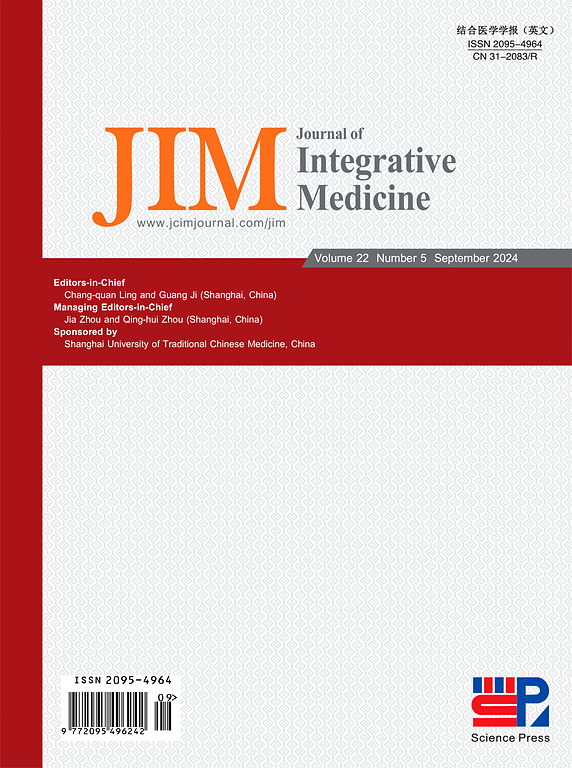Chinese herbal medicine for dyspnea and persistent symptoms of long COVID: A systematic review and meta-analysis of randomized controlled trials
IF 4
2区 医学
Q1 INTEGRATIVE & COMPLEMENTARY MEDICINE
引用次数: 0
Abstract
Background
Over 65 million people have long COVID. Evidence for using Chinese herbal medicine (CHM) to treat long COVID is growing. A systematic review of evidence for guiding clinical decision is warranted.
Objective
To examine the effects and safety of CHM in alleviating the severity of dyspnea, fatigue, exercise intolerance, depression, anxiety and insomnia in long COVID adults based on registered randomized clinical trials (RCT).
Search strategy
World Health Organization International Clinical Trials Registry Platform and Chinese Clinical Trial Registry were searched for registered trial protocols from database inception to February 10, 2023. English (PubMed, Embase, AMED and CINAHL) and Chinese databases (CNKI, Wanfang Data and CQVIP) were then searched to identify relevant publications from December 2019 through April 6, 2023.
Inclusion criteria
Registered RCTs that compared the effects of Chinese herbal medicines or Chinese herbal formulas against a control treatment (i.e., the placebo or usual care) in adults with persistent symptoms of long COVID. The primary outcome of dyspnea, and secondary outcomes of fatigue, exercise intolerance, depression, anxiety and insomnia were measured using validated tools at the end of the treatment.
Data extraction and analysis
Data were extracted, and eligible RCTs were evaluated using version 2 of the Cochrane risk-of-bias tool for randomized trials and Grading of Recommendations, Assessment, Development and Evaluations independently by two researchers. Effect sizes were estimated by random-effects modelling and mean difference (MD). Heterogeneity between trials was quantified by I2.
Results
Among the 38 registered clinical trials we identified, seven RCTs (1,519 patients) were included in the systematic review. One RCT had a low overall risk of bias. Compared to the control, CHM reduces dyspnea on the Borg Dyspnea Scale score (MD = –0.2, 95% confidence interval [CI] = –0.65 to 0.25) with moderate certainty, and reduces fatigue on the Borg Scale (MD = –0.48, 95% CI = –0.74 to –0.22) with low certainty. CHM clinically reduces depression on Hamilton Depression Rating Scale score (MD = –6.00, 95% CI = –7.56 to –4.44) and anxiety on Hamilton Anxiety Rating Scale score (MD = –6.10, 95% CI = –7.67 to –4.53), and reduces insomnia on the Insomnia Severity Index (MD = –4.86, 95% CI = –12.50 to 2.79) with moderate certainty. Meta-analysis of two RCTs (517 patients) showed that CHM clinically improves exercise intolerance by increasing 6-minute walking distance (MD = –15.92, 95% CI = –10.20 to 42.05) with substantial heterogeneity (I2 = 68%) and low certainty.
Conclusion
CHM is associated with a post-treatment clinical reduction in depression and anxiety in long COVID adults, compared to the control, but it does not have a strong treatment effect on dyspnea and insomnia. Effects of CHM on exercise intolerance and fatigue are uncertain, and the safety of using CHM remains questionable.
Please cite this article as: Tsang MS, Zhou IW, Zhang AL, Xue CC. Chinese herbal medicine for dyspnea and persistent symptoms of long COVID: A systematic review and meta-analysis of randomized controlled trials. J Integr Med. 2025; 23(2): 126–137.
中草药治疗长期COVID呼吸困难和持续性症状:随机对照试验的系统评价和荟萃分析。
背景:超过6500万人长期感染COVID。使用中草药治疗新冠肺炎的证据越来越多。有必要对指导临床决策的证据进行系统的审查。目的:通过注册随机临床试验(RCT),探讨中药缓解长冠成人呼吸困难、疲劳、运动不耐受、抑郁、焦虑和失眠严重程度的效果和安全性。检索策略:检索世界卫生组织国际临床试验注册平台和中国临床试验注册中心从数据库建立到2023年2月10日的注册试验方案。然后检索英文(PubMed, Embase, AMED和CINAHL)和中文数据库(CNKI,万方数据和CQVIP),以确定2019年12月至2023年4月6日的相关出版物。纳入标准:注册的随机对照试验,比较中草药或中草药配方与对照治疗(即安慰剂或常规护理)对长期出现COVID持续症状的成年人的影响。在治疗结束时,使用经过验证的工具测量呼吸困难的主要结局和疲劳、运动不耐受、抑郁、焦虑和失眠的次要结局。数据提取和分析:提取数据,使用Cochrane随机试验风险偏倚工具2版对符合条件的随机对照试验进行评估,并由两名研究人员独立对推荐、评估、发展和评价进行分级。效应大小通过随机效应模型和平均差(MD)估计。试验间异质性用I2量化。结果:在我们纳入的38项注册临床试验中,7项随机对照试验(1519例患者)被纳入系统评价。一项RCT总体偏倚风险较低。与对照组相比,CHM减轻Borg呼吸困难量表评分(MD = -0.2, 95%可信区间[CI] = -0.65至0.25),中度确定性减轻Borg呼吸困难量表评分(MD = -0.48, 95% CI = -0.74至-0.22),低确定性减轻Borg呼吸困难量表疲劳(MD = -0.48, 95% CI = -0.74至-0.22)。CHM临床减轻汉密尔顿抑郁评定量表抑郁评分(MD = -6.00, 95% CI = -7.56 ~ -4.44)和汉密尔顿焦虑评定量表焦虑评分(MD = -6.10, 95% CI = -7.67 ~ -4.53),减轻失眠严重程度指数(MD = -4.86, 95% CI = -12.50 ~ 2.79),具有中等确定性。两项随机对照试验(517例患者)的荟萃分析显示,CHM通过增加6分钟步行距离在临床上改善了运动不耐受(MD = -15.92, 95% CI = -10.20 ~ 42.05),存在很大的异质性(I2 = 68%),且确定性较低。结论:与对照组相比,CHM与治疗后抑郁和焦虑的临床减少有关,但对呼吸困难和失眠的治疗效果不强。中草药对运动不耐受和疲劳的影响尚不确定,使用中草药的安全性仍然值得怀疑。曾美娟,周爱文,张爱玲,薛春春。中药治疗长冠肺炎呼吸困难和持续性症状:随机对照试验的系统评价和meta分析。集成医学[J];打印前Epub。
本文章由计算机程序翻译,如有差异,请以英文原文为准。
求助全文
约1分钟内获得全文
求助全文
来源期刊

Journal of Integrative Medicine-Jim
Medicine-Complementary and Alternative Medicine
CiteScore
9.20
自引率
4.20%
发文量
3319
期刊介绍:
The predecessor of JIM is the Journal of Chinese Integrative Medicine (Zhong Xi Yi Jie He Xue Bao). With this new, English-language publication, we are committed to make JIM an international platform for publishing high-quality papers on complementary and alternative medicine (CAM) and an open forum in which the different professions and international scholarly communities can exchange views, share research and their clinical experience, discuss CAM education, and confer about issues and problems in our various disciplines and in CAM as a whole in order to promote integrative medicine.
JIM is indexed/abstracted in: MEDLINE/PubMed, ScienceDirect, Emerging Sources Citation Index (ESCI), Scopus, Embase, Chemical Abstracts (CA), CAB Abstracts, EBSCO, WPRIM, JST China, Chinese Science Citation Database (CSCD), and China National Knowledge Infrastructure (CNKI).
JIM Editorial Office uses ThomsonReuters ScholarOne Manuscripts as submitting and review system (submission link: http://mc03.manuscriptcentral.com/jcim-en).
JIM is published bimonthly. Manuscripts submitted to JIM should be written in English. Article types include but are not limited to randomized controlled and pragmatic trials, translational and patient-centered effectiveness outcome studies, case series and reports, clinical trial protocols, preclinical and basic science studies, systematic reviews and meta-analyses, papers on methodology and CAM history or education, conference proceedings, editorials, commentaries, short communications, book reviews, and letters to the editor.
Our purpose is to publish a prestigious international journal for studies in integrative medicine. To achieve this aim, we seek to publish high-quality papers on any aspects of integrative medicine, such as acupuncture and traditional Chinese medicine, Ayurveda medicine, herbal medicine, homeopathy, nutrition, chiropractic, mind-body medicine, taichi, qigong, meditation, and any other modalities of CAM; our commitment to international scope ensures that research and progress from all regions of the world are widely covered. These ensure that articles published in JIM have the maximum exposure to the international scholarly community.
JIM can help its authors let their papers reach the widest possible range of readers, and let all those who share an interest in their research field be concerned with their study.
 求助内容:
求助内容: 应助结果提醒方式:
应助结果提醒方式:


